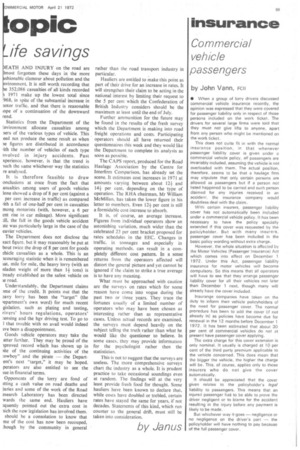Insurance
Page 57

If you've noticed an error in this article please click here to report it so we can fix it.
Commercial vehicle passengers
by John Vann, FCII • When a group of lorry drivers discussed commercial vehicle insurance recently, the opinion was expressed that they were covered for passenger liability only in respect of those persons included on the work ticket. The drivers for several large firms were told that they must not give lifts to anyone, apart from any person who might be mentioned on the work ticket.
This does not quite fit in with the normal insurance position, in that whenever passenger liability cover is given under a commercial vehicle policy, all passengers are invariably included, assuming the vehicle is not overloaded with them. The actual position, therefore, seems to be that a haulage firm may stipulate that only certain persons are allowed as passengers but if a person not listed happened to be carried and such person claimed for any injuries • received in an accident, the insurance company would doubtless deal with the claim.
With certain insurers, passenger liability cover has not automatically been included under a commercial vehicle policy. It has been necessary to have the policy specially extended if this cover was requested by the policyholder. But with many insurers, passenger cover has been included in the basic policy wording without extra charge.
However, the whole situation is affected by the Motor Vehicles (Passenger Insurance) Act which comes into effect on December 1 1972. Under this Act, passenger liability insurance for motor vehicles will become compulsory. So this means that all operators will have to see that they arrange passenger liability cover for all their vehicles not later than December 1 next, though, many will already have the cover included.
Insurange companies have taken on the duty to inform their vehicle policyholders of the need for passenger cover. The normal procedure has been to add the cover (if not already in) as policies have become due for renewal in the 12 months before December 1 1972. It has been estimated that about 30 per cent of commercial vehicles do not at present have passenger cover applying.
The extra charge for this cover extension is only nominal. It usually is charged at 10 per cent of the third party premium applicable to the vehicle concerned. This does mean that the bigger the vehicle, the higher the charge will be. This, of course, applies only to those insurers who do not give the cover automatically.
It should be appreciated that the cover given relates to the policyholder's legal liability to passengers. This means that an injured passenger hat to be able to prove the driver negligent or to blame for the accident resulting in the injury before any payment is likely to be made.
But whichever way it goes — negligence or no negligence on the driver's part — the policyholder will have nothing to pay because of the full passenger cover.












































































































